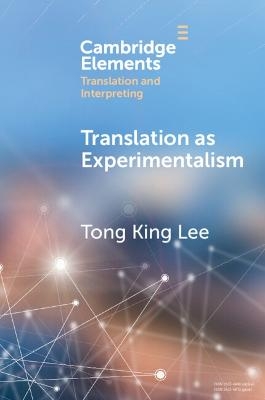
Translation as Experimentalism
Exploring Play in Poetics
Seiten
2022
Cambridge University Press (Verlag)
978-1-108-93295-0 (ISBN)
Cambridge University Press (Verlag)
978-1-108-93295-0 (ISBN)
This Element argues for a perspective on literary translation based around ludification, using concrete poetry as a test case. It questions assumptions about translatability and opens up the discursive space of literary writing to transgressive articulation and multimodal performance. This title is also available as Open Access on Cambridge Core.
This Element argues for a perspective on literary translation based around the idea of ludification, using concrete poetry as a test case. Unlike rational-scientific models of translating, ludic translation downplays the linear transmission of meaning from one language into another. It foregrounds instead the open-ended, ergodic nature of translation, where the translator engages with and responds to an original work in an experimental and experiential manner. Focusing on memes rather than signs, ludic translation challenges us to adopt an oblique lens on literary texts and deploy verbal as well as nonverbal resources to add value to an original work. Such an approach is especially amenable to negotiating apparently untranslatable writing like concrete poems across languages, modes, and media. This Element questions assumptions about translatability and opens the discursive space of literary writing to transgressive articulation and multimodal performance. This title is also available as Open Access on Cambridge Core.
This Element argues for a perspective on literary translation based around the idea of ludification, using concrete poetry as a test case. Unlike rational-scientific models of translating, ludic translation downplays the linear transmission of meaning from one language into another. It foregrounds instead the open-ended, ergodic nature of translation, where the translator engages with and responds to an original work in an experimental and experiential manner. Focusing on memes rather than signs, ludic translation challenges us to adopt an oblique lens on literary texts and deploy verbal as well as nonverbal resources to add value to an original work. Such an approach is especially amenable to negotiating apparently untranslatable writing like concrete poems across languages, modes, and media. This Element questions assumptions about translatability and opens the discursive space of literary writing to transgressive articulation and multimodal performance. This title is also available as Open Access on Cambridge Core.
1. Play as paradigm; 2. Case examples: translating concrete poetry; 3. Implications and conclusions; References.
| Erscheinungsdatum | 19.07.2022 |
|---|---|
| Reihe/Serie | Elements in Translation and Interpreting |
| Zusatzinfo | Worked examples or Exercises |
| Verlagsort | Cambridge |
| Sprache | englisch |
| Maße | 152 x 230 mm |
| Gewicht | 120 g |
| Themenwelt | Geisteswissenschaften ► Philosophie ► Erkenntnistheorie / Wissenschaftstheorie |
| Geisteswissenschaften ► Sprach- / Literaturwissenschaft ► Sprachwissenschaft | |
| Sozialwissenschaften | |
| ISBN-10 | 1-108-93295-9 / 1108932959 |
| ISBN-13 | 978-1-108-93295-0 / 9781108932950 |
| Zustand | Neuware |
| Informationen gemäß Produktsicherheitsverordnung (GPSR) | |
| Haben Sie eine Frage zum Produkt? |
Mehr entdecken
aus dem Bereich
aus dem Bereich
die Grundlegung der modernen Philosophie
Buch | Softcover (2023)
C.H.Beck (Verlag)
18,00 €
Buch | Softcover (2023)
Reclam, Philipp (Verlag)
7,00 €

![Was heißt Denken?. Vorlesung Wintersemester 1951/52. [Was bedeutet das alles?] - Martin Heidegger](/media/113619842)
